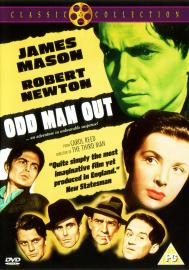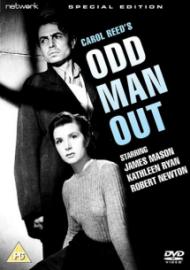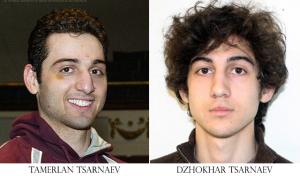
Jerry Tallmer
Boston's Odd Man Out
On the night that Dzhokhar A. Tsarnaev, 19, marathon bomber on the run, was found bloodied and half dead in a boat in the back yard of a house in Watertown, Massachusetts, I suddenly realized I had seen this movie before. Indeed I had seen it a number of times over the years since its cinematic birth in 1947 (sixty-six years ago!) because it is one of the greatest movies ever made – some would say the greatest – and, as it turned out last weekend, one of the most eerily predictive. Enough guessing games. The film is Carol Reed's "Odd Man Out," tracing the long night's journey of young Johnny McQueen (the great James Mason, then 38), Irish revolutionist and wanted killer – a bank robbery gone wrong – on the run through the entire locked-down city of Belfast, Northern Ireland, where every face is either closed against him or trying to exploit him or to turn him in. Every face except one, that of the woman (Kathleen Ryan) who loves him. It is impossible not to see the parallel but also not to see the differences. The most glaring parallel is that the driving force in both cases is political passion, or, if you like, political craziness – the quasi-religious fervor that leads you to kill anything or anybody (a marathon spectator, a bank teller) who can be seen as standing in the way of Irish freedom, Chechnyan freedom. The differences also involve matters of faith, for the wrenching
high point of "Odd Man Out" comes when bleeding, hallucinating
Johnny McQueen, dragged into the studio of a nutty artist (Robert
Newton) who wants to paint the fugitive as Christ, suddenly totters
to his feet and starts shouting out 1st Corinthians 13:
It does not seem likely that 19-year-old Dzhokhar Tsarnaev or big brother Tamerlan Tsarnaev, 26, now deceased, cared much about 1 Corinthians 13 one way or the other. Indeed, one wonders whether the Islamic Czechnyans who have been bombing Moscow to pieces and terrorizing theaters full of women and children these recent years, have any moral sense whatever. Or not any moral sense that one can equate with normal, rational thought processes. The most normal, rational figure in "Odd Man Out" is neither Johnny McQueen or the girl who loves him – loves him to death actually – but the tall, quiet, contemplative police inspector (Denis O'Dea) who has to find him and bring him in, dead or alive. You can guess which. Reminds me of the several astonishingly level-headed authority figures – cops, the Mayor, the Governor – whom we gratefully got to know so well over shootout weekend. "Odd Man Out" was directed by Carol Reed from a script by him, F.L. Green, and R.C. Sheriff, based on a novel by Green. Most of the actors (but not Mason) were drawn from Dublin's great Abbey Theater. The Father Tom, a sympathetic old priest, is played by Abbey founder W.G. Fay. One does not have to sympathize with the Dzhokhar Tsaernaev who may be dead in his hospital bed by the time this sees print. But it is easy to sympathize with the drama of one isolated human being on the throughout an entire locked-down city of Boston and environs. There are those who will say that "The Third Man" was Carol Reed's greatest film. Well, that was a pretty good movie too. Even had its own man on the run: Orson Welles as Harry Lime. But "Odd Man Out" got there first – by two years. |
| museums | NYTW mail | recordings | coupons | publications | classified |



